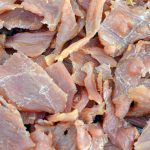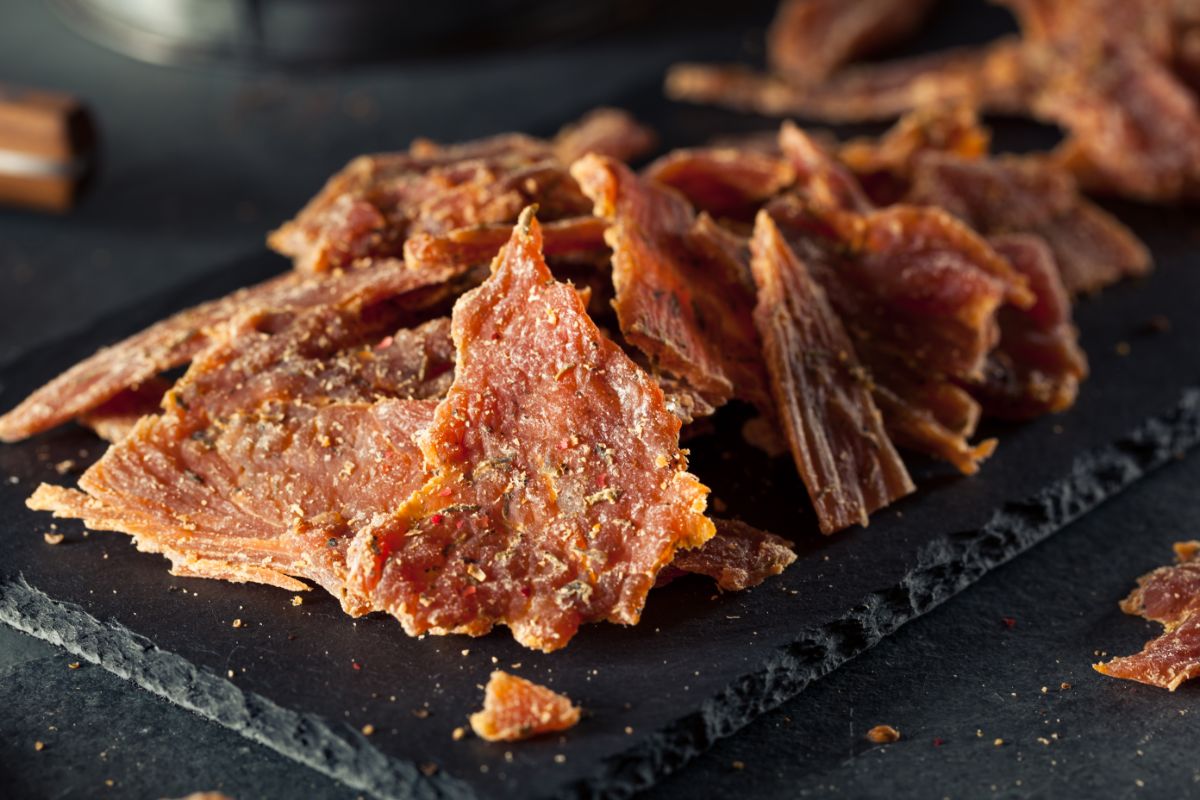To make dehydrated turkey jerky, cut lean turkey meat into thin ¼-inch strips and marinate it overnight. Pat the strips dry with a paper towel and place the turkey strips on food dehydrator trays. Dry at 145˚F in a food dehydrator for 4 to 6 hours. Allow the turkey jerky to cool before storing it in an airtight container.
Table of Contents
What’s the Best Way to Dehydrate Turkey?
The best way to dehydrate turkey is in a food dehydrator after it has been cooked. A food dehydrator lets you control the temperature and keep it consistent, ensuring even drying. It is better than using an oven because the temperature fluctuates in an oven and doesn’t allow moisture to escape.
Print
Easy Teriyaki Dehydrated Turkey Jerky Recipe
- Total Time: 6 hours, 35 minutes
Description
Being lower in fat, turkey jerky is a healthier alternative to beef jerky. Using great-tasting ingredients that you likely already have on hand, this high-protein dehydrated turkey recipe is great for beginners and makes a wonderful snack!
Ingredients
- 1-pound skinless cage-free turkey breast
- 1/4 cup pineapple juice
- ¼ cup low-sodium soy sauce
- 2 teaspoons Worcestershire sauce
- 1 teaspoon ground black pepper
- 1 teaspoon garlic powder
- ½ teaspoon red chili flakes
- 1 teaspoon of honey
Instructions
- Freeze the turkey breast for 30 minutes or until firm before slicing.
- Meanwhile, whisk together all the ingredients for the marinade in a medium-sized bowl.
- Using a sharp knife, cut the turkey breast across the grain into even ¼-inch-thick slices. Cutting it across the grain will yield a chewy jerky.
- Coat your turkey slices with the marinade and place them in a pot. Add a cup of water and let the liquid come to a boil. Then, simmer until the meat slices reach 165˚F (check the temperature using a meat thermometer).
- Drain your turkey slices in a colander and pat them dry with a paper towel.
- Place the turkey slices on the dehydrator trays in a single layer, leaving enough space between the slices.
- Dehydrate the turkey pieces at 145˚F until fully dry. The total time to make dehydrated turkey will vary depending on the size and thickness of the pieces, so start checking for doneness every hour. Flip and re-arrange dehydrator trays as needed to ensure even drying.
- Once the turkey is dry, allow it to cool to room temperature. Store your turkey jerky in an airtight container, or enjoy it immediately!
- Prep Time: 15 minutes
- Dehydrating Time: 6 hours
- Cook Time: 20 minutes
Nutrition
- Serving Size: 1 ounce
- Calories: 60kcal
- Sugar: 5g
- Sodium: 270mg
- Fat: 1g
- Saturated Fat: 0g
- Carbohydrates: 6g
- Fiber: 0g
- Protein: 11g
- Cholesterol: 10g
Can You Dehydrate Raw Turkey?
For turkey to be safe to eat, its internal temperature should reach 165°F before dehydrating.
The temperature of most dehydrators is not high enough to kill harmful microorganisms that may be present in raw turkey breast or ground turkey. Although fully dehydrated turkey jerky may seem done, it is unsafe to eat unless it undergoes further heat treatment.
How Long Does it Take to Dehydrate Cooked Turkey?
It takes 4 to 6 hours to dehydrate cooked turkey at 145°F. If the dehydrator temperature is set to 160°F, it will take 4 to 5 hours to dehydrate cooked turkey.
What are the Benefits of Dehydrating Turkey?
Dehydrating turkey has many incredible benefits:
- Convenient and Portable: Since dehydrated turkey jerky is safe to keep at room temperature, it is an excellent snack to carry with you on trips.
- Healthy Snack: Dehydrated turkey offers the same health benefits as cooked turkey and is high in potassium. Turkey jerky also makes a healthy snack because it is high in protein, which promotes muscle growth.
- Longevity: Dehydrating turkey makes it last longer. When stored properly in an airtight container, dehydrated turkey can last for 2 to 3 months.
- Save Money: Store-bought jerky is expensive. Dehydrating turkey is an economical way to enjoy your favorite snack and stretch your dollars.
Marinade Ideas for Making Dehydrated Turkey Jerky
Marinating turkey is a fantastic way to add flavor to your favorite grain-free poultry and avoid preservatives and food additives found in store-bought jerky. Check out these delicious marinade options:
- Cajun Marinade: This marinade uses paprika, garlic, and cayenne pepper to give your turkey jerky a bit of Southern flair.
- Citrus-Chipotle Turkey Marinade: This marinade recipe adds a fresh citrus twist to your turkey jerky.
- Lemon Pepper Marinade: This classic marinade is great for making dehydrated turkey breasts and turkey jerky.
Storage and Shelf Life of Dehydrated Turkey
Store dehydrated turkey in an airtight container in a cold, dry place for 2 to 3 months. You can increase the shelf life to 12 months by storing dehydrated turkey in a freezer.
Avoid storing your turkey jerky in direct sunlight because heat can shorten the shelf-life and affect the quality of the food.
Is Dehydrated Turkey Safe for Pets to Eat?
With your vet’s approval, dehydrated foods such as turkey, chicken, and even sweet potatoes can be a nutritious part of your dog’s diet.
Dehydrated turkey is not only safe for pets to consume, but it also provides many healthy nutrients, including dietary protein, chondroitin, glucosamine, phosphorus, calcium, riboflavin, and other minerals.
Unlike many dog treats, dehydrated turkey is great for dogs to chew on. It is an excellent pet food substitute for when you don’t have other dog food options available.

